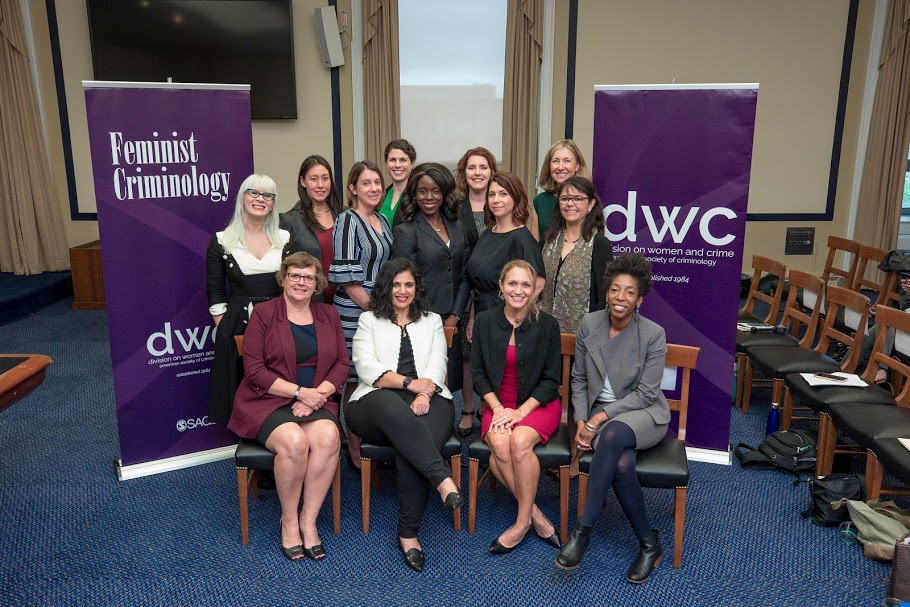This fall, two faculty members from the Department of Criminal Justice took their research outside of the classroom—these Redbirds were invited to fly east to Washington, D.C.
Congressional briefing
The Division on Women and Crime (DWC) of the American Society of Criminology (ASC) hosted its first Congressional briefing in October. In this briefing, titled “Translating Research to Policy: Improving Justice for Women & Girls,” DWC researchers made evidence-based policy recommendations aimed at improving justice for women and girls. The panelists offered suggestions for strengthening existing programs and policies, modifying current legislation and executive decisions, and establishing new legislative and funding initiatives. Faculty members Shelly Clevenger and Cara Rabe-Hemp were invited to apply and then selected through a competitive process through the DWC of the ASC.
About the Division on Women and Crime
The Division on Women and Crime (DWC) is a unit of the American Society of Criminology (ASC). Founded in 1941, ASC is an international organization whose members pursue scholarly, scientific, and professional knowledge concerning the measurement, etiology, consequences, prevention, control, and treatment of crime and delinquency. Established in 1984, the DWC is comprised of scholars and practitioners within ASC who are committed to feminist perspectives on gender, crime, and justice. In 2006 the DWC launched its own journal, Feminist Criminology, an international publication dedicated to feminist criminological scholarship about women, girls, crime, and justice.
At the briefing, Clevenger shared insights from her research with Jordana Navarro, Ph.D., (The Citadel) on reducing and preventing the cyber-abuse of women and girls. She made recommendations for the Ending Nonconsensual Online User Graphic Harassment (ENOUGH) Act of 2017. “My favorite part was being able to share the results of my research with the people who could make a change that would help survivors,” said Clevenger.
“I got to learn so much from the other presenters about their research and the related goals that they have for policy and change,” said Clevenger. “I was honored and proud to be among such strong and intelligent women.”
Rabe-Hemp presented recommendations from her research on women’s participation in peacekeeping and security efforts. She made recommendations for the Women, Peace, and Security Act of 2017 and for Community Oriented Policing Services (COPS) Office funding. “My favorite part of this event was speaking to legislators about the importance of the representation of women in peacekeeping and policing, recognizing what international women’s organizations have long argued—there is a connection between increased representation of women police officers and a range of peacekeeping improvements, including less violence against women and terrorism prevention,” said Rabe-Hemp.
“All of the speakers showcased cutting-edge areas of feminist criminological scholarship that have immediate policy relevance to improve justice outcome for women and girls. It was inspiring to see women across the United States all working for the same common cause,” said Rabe-Hemp.
Learn more about the briefing here.
Research summit
Rabe-Hemp was invited back to Washington, D.C., in December to participate in the National Institute of Justice (NIJ) Research Summit on Women in Policing. “For this summit, NIJ brought together line, mid-rank, and executive police officers, researchers, international experts, and professional associations to explore the current literature on women in policing; identify barriers to recruitment, retention, and promotion; explore the realities that women working in the policing field face; and identify promising practices for increasing representation and improving culture,” explained Rabe-Hemp.
She presented her research during the fireside chat, entitled “The impact of policing culture on women’s experiences and opportunities in the field.” Rabe-Hemp shared her research, which focuses on how gender affects officers’ opportunities and experiences in the profession of policing. She highlighted what we know about women officers’ experiences in rural and urban police departments; career paths of women in police organizations; and women’s survivability in the traditionally male dominated profession of policing. Most importantly, she shared the experiences of women working in the field.
Rabe-Hemp has interviewed 60 women police from all across the nation, and in all areas of policing. Their heartfelt and amazing stories are captured in the book published earlier this year, Thriving in an All Boys Club: Female Police Officers and their Fight for Equity (Rowman & Littlefield Publishers).
“Being asked to speak at the National Institute of Justice as a scholar and expert is one of the highlights of my career. I left the two-day summit inspired. The potential for enduring change through the inclusion and advancement of women in law enforcement is too great to risk the continued consequences of the lack of diversity and female representation in policing,” said Rabe-Hemp.
After the summit, NIJ will produce a special report to chart the course for future research.
Read some remarks from the summit here.

